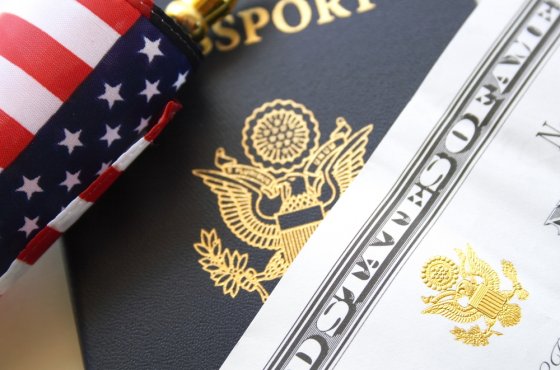How to Get a Personal Loan for Non-U.S. Citizen? Things to Know
People from all over the world want to make their way stateside nowadays. It could be going after a degree, wanting to start a business, or looking for more opportunities. No matter where you’re from, either. The fact is, most times, you’ll need some money to make your goals happen in the US.
Getting a personal loan when you aren’t a citizen can be tricky. Rules and such make it confusing. This article’s here to help explain that whole mess for anybody looking to get a personal loan that way, and we’ll get into what makes you eligible, how to apply, and crucial things to know. Whether you’re studying abroad, working visa, or being a permanent resident, it doesn’t matter. The point is having the cash to do what you want to do.

Photo: Shutterstock
Can you get a personal loan as a non-U.S. citizen?
Non-citizens can apply for personal loans, but it’s usually more challenging than citizens. Lenders examine two significant details: how long you’ve lived here and your credit history.
Since personal loans take a few years to pay off, lenders get nervous that you might leave the country before finishing payment. Non-citizens need time to build credit, so they often need more history for lenders to look at. However, foreigners with credit issues could rely on lenders who provide bad credit personal loans with guaranteed approval up to $5,000. Usually, such lenders don’t have a minimum credit score requirement, and they welcome applicants with all types of credit scores.
Green card holders have an easier time since they can show they plan to stay and have Social Security numbers to help check credit. Some lenders take ITIN numbers instead, but most still want Social Security.
Visas can help, too, if they last longer than the personal loan term you’re asking for. It reassures lenders you’ll stick around to repay everything. The longer you’ve been here and the more credit history you have, the better chance you’ve got. But it’s trickier for non-citizens even if you do everything right. Rules vary between lenders and change a lot.
How much do loans for immigrants cost?
Getting loans in the US as an immigrant can be tricky and more expensive. If you don’t have much credit history or aren’t a citizen yet, you’ll have to deal with higher interest rates (up to 375%) and additional fees compared to people who’ve been here awhile and are citizens.
The type of loan makes a difference, too. For example, if you need a personal loan or have to use one of those sketchy payday loan places, you will most likely get slammed with high interest rates either way. For those with good or fair credit history, steady income, and solid collateral, the interest rates don’t exceed 35.99%.
How hard is it for foreigners in the USA to get a loan?
Getting a personal loan from someone from another country can be tricky in America, depending on your visa, credit report, income, and what the lender needs. Here’s some stuff to think about:
- Immigration status. Some lenders want you to have a green card or visa before giving you money; others are more flexible and will take alternate ID numbers.
- Credit history. Building credit and starting fresh in the U. S. is hard. Lenders look at your credit score and past loans to decide whether you’re risky. No American credit history often means you look risky.
- Income and jobs. Lenders check whether your income and employment seem steady so you can pay the money back. Having a regular job and decent pay makes them more likely to approve you.
- Putting up collateral. Think about your car or house; it can help, too. It gives the lender some security if you default on the loan.
- Citizenship or permanent residence. Having an American citizen or permanent resident sign on as a cosigner can boost your chances if you have strong credit.
Is it possible to apply for a personal loan without a social security number?
Getting a personal loan without a social security number as an immigrant can be tricky, but it’s not impossible. Many lenders want that number so they can check your identity and see if you’ve paid bills on time in the past.
However, you can find a lender that offers personal loans explicitly made for immigrants or non-citizens who still need social security numbers. You’ll need to look into credit unions or small community banks more than big national chains. Some are more open to alternative forms of ID and stuff for immigrants. Loans without social security numbers happen, but you must put in extra effort to find the right lender and show you’re still creditworthy.
Do your homework and shop around before signing anything. Look carefully at the fine print for the rates and fees you’ll pay over time, the payment plans, whether you qualify, etc. Also, see if any special loan programs through nonprofits or community groups are intended for immigrants and people with limited options. Nobody can guarantee they’ll be easy to find or crazy cheap, but it is worth checking into to avoid anything too predatory. Having an advisor or case worker help navigate things might shed some light.
Personal loans for undocumented immigrants: Main Features
Loans targeting those without paperwork status have the main things that set them apart. They try to work for people who need socials or green cards. The companies only check credit scores a little. They look more at your job and income over time, and you don’t need collateral either since many people here can’t pledge assets.
The rates are higher than usual, though. It’s riskier for multiple lenders, so that makes sense. Borrowers should still compare different loans because the rates vary. It’s critical to understand the actual cost before signing anything. There are options if you look around.
Lenders offering personal loans to undocumented immigrants may limit how much can be borrowed or make people pay it back faster. It helps reduce the lender’s risk and ensures borrowers can pay off the debt realistically.
Some lenders or nonprofits also provide financial literacy resources to help people understand personal loans better, get better at managing money, and slowly build their credit. Local credit unions, community organizations that offer loans, or nonprofits that help underserved groups could have better personal loan options for undocumented immigrants and understand their situation better.
How to find personal loans for non-U.S. citizens?
Finding personal loans for non-U. S. citizens is challenging, but you can do it with enough information. Here are some things you can try to find personal loans:
Research Lenders
Look into lenders that give personal loans to people without U. S. citizenship or permanent residence, and some lenders focus on loans for non-citizens.
- Credit Unions. Such organizations might be more flexible than traditional banks for lending. Some offer personal loans to non-U.S citizens.
- Online Lenders. Check out online lending platforms made for international borrowers. Many online lenders have accessible applications and may look at other things besides citizenship.
- Peer-to-Peer Lending. Think about peer-to-peer lending sites where people lend money to others. Some of them take non-U. S. citizens as borrowers.
Build Credit History
If you stay in the U.S. for a while, build your credit. Good or fair credit scores can help you qualify for a personal loan.
Provide Collateral
Some lenders need collateral like real estate or cars to secure the loan, especially if you don’t have strong credit.
Try a Cosigner
If you have a friend or family member who’s a citizen or permanent resident here in the States with good credit, you could ask them to co-sign the loan for you. Having a co-signer voucher to the lender might help you get approved.
Gather Required Documents
You’ll also want to get your paperwork together — passport, visa, pay stubs, proof you live here now. Some lenders specifically need certain documents from non-U.S citizens trying to obtain loans.
How do you prepare for the personal loan application as an immigrant?
First, know your visa type and expiration status, work permit details, etc. Lenders want proof you can legally work and live here.
Next, start establishing credit if you’re new in the U.S. Open a bank account, get a secured credit card, and pay bills on time. That responsibility looks good to lenders.
Then, check your credit reports and fix any mistakes you see. You can make it once a year for free through federal services.
You’ll need to show ID, too: passport, license, or whatever proves who you are. Also, bring proof of income and residence — pay stubs, tax forms, utility bills.
Another tip is calculating expenses versus income to determine what loan payment you can afford each month. Lenders check something called your debt-to-income ratio.
Finally, look into lenders open to immigrants who have good credit histories. Smaller banks and online places can be more flexible than big-name companies. It takes some upfront work, but being prepared boosts your chances at that personal loan as an immigrant.
Alternatives to traditional personal loans for non-U.S citizens
If you can’t get approved for a personal loan, other ways exist to get money worth looking into. Steer clear of short-term, high-cost loans like payday loans. They can trap you in debt. But some better choices exist.
Lending circles are groups of people who pool their money together to make interest-free loans to each other when someone needs help. If they already happen in your area, join one. Or you can sign up through Mission Asset Fund, which connects you with a local group of 6-12 people lending sums between $300 and $2400.
Your local credit union may offer specialized loans for non-U.S citizens, covering loan application fees, filings, and renewals. Sometimes, they are called immigration, dreamer, or citizenship loans. Many also do ITIN loans, where you apply with an Individual Taxpayer Identification Number instead of a Social Security Number. You’ll need to become a member first before asking for money.
Loans for immigrants: Bottom Line
Getting a personal loan when you’re not a citizen can be tricky. You must jump through some extra hoops that citizens don’t; even then, something must be guaranteed.
First, know what lenders are looking for. They’ll want your credit history, income documents, and some collateral. And it probably needs to be pretty solid. You’d better be ready to make your case if you’re not a citizen.
We suggest you shop around, too. Hit up banks, online lenders, and some private ones. You will find a lender that offers personal loans for non-U.S. citizens. Rates and repayment terms will vary. Do your homework. You can also talk to a financial advisor. They can point you to lenders who work with non-U.S. citizens. Consider alternatives like secured credit cards to build your score. The path to a loan as an immigrant can be winding, so guides help.
Loans for non-U.S citizens are doable but expect obstacles. Come prepared with a robust application. Be ready to put in effort. But if you check all the boxes, have patience, and hunt for options, you can land something and know it’ll likely take more work than your friend with a blue passport.
Читайте также на ForumDaily:
Customized Detox Plans and Services
Moving Insurance: What You Need to Know
How to Deal with an Underwater Mortgage Without Defaulting
Подписывайтесь на ForumDaily в Google NewsХотите больше важных и интересных новостей о жизни в США и иммиграции в Америку? — Поддержите нас донатом! А еще подписывайтесь на нашу страницу в Facebook. Выбирайте опцию «Приоритет в показе» — и читайте нас первыми. Кроме того, не забудьте оформить подписку на наш канал в Telegram и в Instagram— там много интересного. И присоединяйтесь к тысячам читателей ForumDaily New York — там вас ждет масса интересной и позитивной информации о жизни в мегаполисе.











